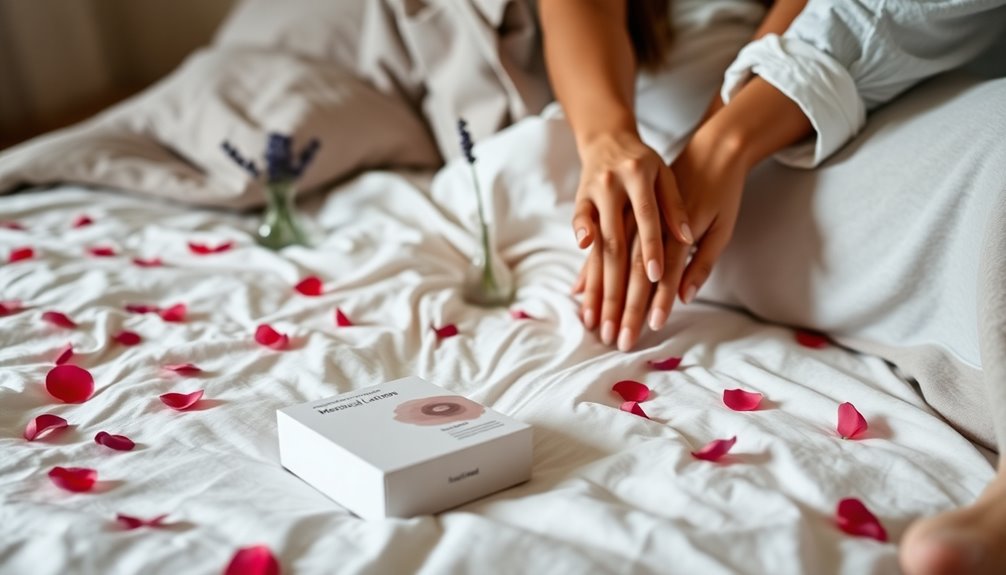It's safe to have sex while you're on your period if you take certain precautions. Though there's a chance of pregnancy, as sperm can survive for a few days, the real concern is the risk of STIs due to increased exposure to menstrual blood. Using condoms is essential to reduce these risks. Many people find that menstrual sex can actually relieve cramps and enhance intimacy. Just communicate openly with your partner about preferences and comfort levels. If you're curious about tips for a more enjoyable experience and how to stay safe, there's more to explore.
Key Takeaways
- Menstrual sex is generally safe, but awareness of potential risks, such as STIs and pregnancy, is important.
- Communicating openly with your partner about comfort levels and boundaries enhances the experience.
- Using condoms significantly reduces the risk of STIs and unintended pregnancy during menstruation.
- Engaging in sex during lighter flow days can minimize mess and enhance comfort.
- Benefits include potential relief from cramps and increased intimacy between partners.
Overview of Menstrual Sex

When it comes to menstrual sex, many people might feel unsure about the idea, but it's a natural part of many couples' intimate lives. Engaging in sexual activity during a woman's period can include vaginal, oral, or anal sex.
While concerns about hygiene and potential health risks often arise, it's important to know that menstrual sex can be safe when you practice good hygiene and use condoms. Curiously, some studies suggest that this type of intimacy might help alleviate menstrual cramps by releasing endorphins and improving blood flow.
Open communication between partners is essential, as preferences and cultural beliefs vary widely. By discussing your comfort levels, you can enhance your experience and deepen your connection during this natural phase.
Risks of Having Sex During Period

While many couples may choose to engage in sexual activity during a woman's period, it's important to be aware of the potential risks involved. Here are some key concerns to keep in mind:
- There's a possibility of pregnancy since sperm can survive in the reproductive tract for up to five days.
- The risk of sexually transmitted infections (STIs) increases due to menstrual blood, which may facilitate the transmission of diseases like HIV and hepatitis.
- Changes in the cervix during menstruation can heighten susceptibility to infections.
- Menstrual blood can carry pathogens, making barrier methods like condoms vital for reducing STI risks.
Being informed about these risks can help you and your partner make safer choices during this time.
Benefits of Period Sex

Having sex during your period can actually bring some surprising benefits.
You might find relief from cramps, enjoy a more intimate experience, and benefit from natural lubrication.
Embracing this time can enhance both your physical and emotional well-being.
Pain Relief Benefits
Engaging in sex during your period can actually provide significant pain relief. The release of endorphins during orgasm can ease your menstrual cramps and help reduce muscle tension in the uterus.
Plus, orgasms can trigger uterine contractions that may shorten the duration of your period.
Consider these pain relief benefits:
- Endorphin release can alleviate discomfort.
- Uterine contractions may expedite shedding the uterine lining.
- Natural lubrication enhances sexual pleasure and reduces friction.
- Increased blood flow heightens sensitivity and arousal.
With these factors combined, you might find that period sex not only boosts your mood but also offers an unexpected remedy for the aches and pains associated with menstruation.
Enhanced Intimacy Experience
When you choose to have sex during your period, it can create a unique opportunity for enhanced intimacy between you and your partner. Engaging in this activity fosters open communication and vulnerability, allowing you both to express your comfort levels and preferences.
The release of endorphins during orgasm not only alleviates menstrual cramps but also deepens your emotional bonding, creating a shared experience that challenges societal taboos. You might find heightened sexual arousal and sensitivity during your period, leading to increased pleasure and satisfaction for both of you.
This intimate connection can strengthen your relationship, making the experience not just about physical pleasure, but about deepening your emotional ties as well.
Natural Lubrication Advantage
Often overlooked, the natural lubrication provided by menstrual blood can greatly enhance your sexual experience during this time. This unique advantage can lead to increased pleasure and comfort.
- Menstrual blood reduces friction, making sex more enjoyable.
- The hormonal changes during your period may heighten sensitivity.
- Natural lubrication alleviates discomfort related to vaginal dryness.
- Engaging in sex can create a more seamless experience without needing additional lubricants.
Preventing Pregnancy and STDs

Having sex during your period might seem less risky for pregnancy, but it's important to remember that sperm can survive for up to five days in the female reproductive tract. This means you could still conceive if you ovulate shortly after your period ends.
To prevent pregnancy, consider using reliable birth control methods, like birth control pills, and always consult a healthcare professional for personalized advice.
Moreover, the risk of sexually transmitted infections (STIs) can increase during menstruation due to menstrual blood.
Using barrier methods, like condoms or dental dams, is essential to reduce the risk of STIs and unintended pregnancies. Regular testing for STIs is also recommended to stay informed about your health status and make safer sexual decisions.
Understanding STDs and Menstruation

Understanding the relationship between menstruation and sexually transmitted infections (STIs) is essential for maintaining your sexual health.
During your period, the presence of menstrual blood can increase the risk of STI transmission, as it may facilitate the spread of pathogens like HIV and hepatitis. Engaging in unprotected sex during this time can expose both you and your partner to these risks.
- Use protection, like condoms, to reduce the risk of STIs.
- Maintain proper hygiene to prevent bacterial vaginosis or yeast infections.
- Regularly get tested for STIs, even if you feel fine.
- Communicate openly with your partner about sexual health and history.
Practical Tips for Comfortable Period Sex

Sex during your period can be a pleasurable experience with the right approach. To make period sex a comfortable experience, try engaging in sex on lighter flow days to minimize mess.
Use dark-colored towels or sheets to manage potential stains, and keep cleaning supplies like wet wipes handy for easy cleanup. Consider menstrual cups or discs to help reduce flow during sex, enhancing comfort.
Experiment with different positions, such as side-lying or shower sex, to find what feels best for both of you. Most importantly, maintain open communication with your partner about boundaries and preferences.
This guarantees a positive and consensual experience, making period sex something you both can enjoy without stress or discomfort.
Oral Sex Considerations During Menstruation

Exploring intimacy during your period can include oral sex, which is generally safe when proper precautions are taken.
Maintaining hygiene is essential for both partners' comfort and sexual health. Here are some key considerations:
- Use menstrual cups or tampons to manage leakage.
- Consider utilizing dental dams to lower the risk of STIs.
- Keep towels or wipes nearby for easy cleanup.
- Communicate openly about preferences and comfort levels.
Psychological Effects on Sexual Activity

While hormonal fluctuations during menstruation can stir up mood swings, they may also influence your sexual desires and experiences. Some people find that increased blood flow enhances sensitivity and pleasure during sex.
However, psychological stigma surrounding period sex can lead to feelings of shame or discomfort, impacting your emotional responses and overall satisfaction. Open communication with your partner about these feelings is vital, as it can foster intimacy and understanding.
If you experience pre-menstrual dysphoric disorder (PMDD), emotional symptoms may intensify, making it even more important to address your feelings and needs.
Birth Control Options During Menstruation

When you're on your period, it's important to contemplate your birth control options.
Hormonal methods like pills or patches can still be effective, while barrier methods like condoms can prevent STIs and unintended pregnancies.
Plus, if you have unprotected sex, emergency contraception is available to help avoid pregnancy, no matter the time of the month.
Hormonal Methods Overview
Hormonal birth control methods offer a range of options that can enhance your sexual experience during menstruation. These methods, like the pill, patch, or hormonal IUD, can help regulate your cycles and reduce menstrual symptoms, making intimacy more enjoyable.
They also lower the pregnancy risk considerably by preventing ovulation. Here are some benefits of using hormonal birth control during your period:
- Lighter periods and fewer cramps
- Flexibility to skip periods if desired
- Enhanced comfort during sexual activity
- Reliable protection against pregnancy
Consulting with your healthcare professional is essential to find the best hormonal contraceptive that suits your individual health needs and lifestyle.
This way, you can make informed choices about your sexual health during menstruation.
Barrier Methods Effectiveness
Barrier methods of birth control, like condoms and dental dams, are effective options for maintaining sexual health during your period. They help prevent both pregnancy and sexually transmitted infections (STIs) when used consistently and correctly.
Condoms have an effectiveness rate of about 85% in preventing pregnancy while also markedly reducing STI transmission during period sex. If you're engaging in oral sex, dental dams provide a reliable barrier against STIs. Just be sure your barrier methods aren't expired, as improper use can greatly reduce their effectiveness.
Additionally, menstrual cups can help manage your flow during sexual activity, minimizing mess and maintaining hygiene while offering barrier protection. Using these methods helps guarantee a safe and enjoyable experience during your menstrual cycle.
Emergency Contraception Options
Emergency contraception (EC) offers several options for those who might be concerned about unintended pregnancy during their period. If you have unprotected sex, you can use EC pills like Plan B or Ella, which are most effective when taken within 72 to 120 hours after intercourse.
These pills primarily work by delaying ovulation, as sperm can survive in your reproductive tract for several days.
- EC is available over-the-counter at pharmacies.
- Always consult a healthcare provider for personalized advice.
- EC doesn't protect against sexually transmitted infections (STIs).
- Consider using condoms to reduce the risk of STIs.
Communication With Partners

How can open communication enhance your experience during period sex? It fosters trust and intimacy between you and your partner.
Discussing your preferences, comfort levels, and any concerns about hygiene can create a relaxed atmosphere. Being upfront about potential messiness helps both of you feel more at ease.
It's also important to talk about your feelings regarding menstrual sex, including any cultural or personal beliefs that might affect your views.
Establishing clear consent and boundaries before engaging in sexual activity guarantees you both feel respected and comfortable.
Regular conversations about sexual health, including discussions on STIs, can further enhance understanding, promoting safer practices during period sex.
Communication is key to making the experience enjoyable for both partners.
Frequently Asked Questions
Is Period Blood Okay During Sex?
Absolutely, period blood is just a natural bodily fluid, so it's perfectly okay during sex.
Many people find that engaging in sexual activity can even help relieve menstrual cramps due to the release of endorphins.
Just remember to communicate openly with your partner about comfort levels.
If you're concerned about cleanliness or potential STI transmission, using protection and practicing good hygiene before and after can enhance the experience for both of you.
Is It Okay to Have Unprotected Sex While on Your Period?
While it might feel like a red flag, having unprotected sex during your period can be riskier than you think.
Though the chances of pregnancy are lower, sperm can hang around for several days, and unexpected ovulation is always a possibility.
Plus, unprotected sex increases your risk of STIs, as menstrual blood can facilitate transmission.
If you're considering it, talk to a healthcare provider about safe practices and effective birth control options.
What Are the Side Effects of Sex During Your Period?
When you have sex during your period, you might experience increased menstrual flow afterward, which could lead to discomfort.
The presence of menstrual blood can heighten the risk of sexually transmitted infections, so using condoms is essential.
You may also face vaginal dryness if tampons aren't removed beforehand.
Additionally, changes in your vaginal flora during menstruation can make you more susceptible to infections.
Some find relief from cramps, while others may feel exacerbated symptoms from conditions like endometriosis.
When Should You Avoid Sex During Your Period?
When you think of a raging river, it's clear that sometimes, you should steer clear of the currents.
Similarly, during your period, avoid sex on the heaviest flow days to minimize mess and discomfort.
If cramps or pain hit hard, it's best to wait until you feel better.
Also, listen to your body—if you have infections or medical conditions, check with your healthcare provider to verify you're making safe choices.
Conclusion
To sum up, having sex during your period can be safe and enjoyable if you take the proper precautions. As the saying goes, "knowledge is power," so understanding the risks and benefits allows you to make informed decisions. Communicating openly with your partner about comfort and preferences can enhance the experience. Ultimately, it's all about what feels right for both of you, ensuring that intimacy remains a positive aspect of your relationship, regardless of the time of the month.










